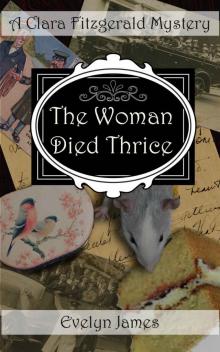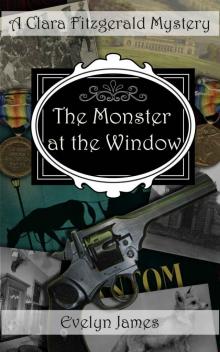- Home
- Evelyn James
The Green Jade Dragon Page 5
The Green Jade Dragon Read online
Page 5
“I would not wish to undermine the police,” Clara said with feigned horror at the very idea.
She left the Gazette offices smiling to herself.
“Spoilsport!” Gilbert called out with a grin as she departed.
Chapter Six
Clara was in two minds when she once again stood in the September sunshine. On the one hand she had a case to attend to, and on the other she had this matter with Miss Butler, which was getting under her skin and driving her insane. The woman was perfectly entitled to try her luck as a detective, but why try to steal Clara’s reputation? Well, that was simply answered; she wanted Clara’s business. Clara toyed with getting on with the Jacobs case, but she knew her irritation with Miss Butler was not going to allow it. She was too distracted to concentrate on a burglary. So she headed instead for Abercrombie Street.
The road where Miss Butler had her offices was a humble avenue of terrace houses, mostly the two-up, two-down variety. Families of ten or more crowded into this cramped accommodation, but despite the congestion, the residents of Abercrombie Street prided themselves on their respectability. They might be poor, but they were respectably poor. They kept their doorsteps washed, cleaned their windows, bleached their net curtains and made sure their privies never overflowed. And Mr Dunholm had abused that determined respectability, squeezing every last penny out of the poor souls who found themselves living in his houses.
Clara had first learned of the problem when she was investigating a case of minor fraud. The culprit was a resident of one of Mr Dunholm’s houses who had resorted to crime to try and pay the rising rental costs. Clara had felt sorry for the man who was desperately trying to keep a roof over his family’s heads. He was a low level clerk in a printing firm, a hardworking man who spent six days a week at his job without complaint. He had taken on extra work in the evenings to try and make ends meet, and his wife took in washing and sewing. Yet still they were constantly having to make a decision between eating that week or paying the rent.
When Clara investigated further, she was appalled at the liberties Mr Dunholm was taking. He was charging ridiculous levels of rent, often upping it on a monthly basis and threatening his tenants with eviction when they struggled to pay him. It was not a new story, and there was little in the way of laws to prevent it. But Clara wasn’t going to allow Dunholm to get away with bullying his tenants.
She complained to a lot of people. She made a fuss, and when that failed to help, she passed the story to the Brighton Gazette and suddenly the world came crashing down on Mr Dunholm. The public were outraged, the story was even picked up by one of the national papers. Mr Dunholm was far from unusual, you could find examples of him in every town and city, but not every town and city had a Clara Fitzgerald.
When the full story broke, Mr Dunholm was hounded and vilified. Under the force of public pressure he lowered his rents back to a sensible level and new contracts were signed by his tenants with the stipulation that rent could only be increased once a year and only at a rate reasonable to inflation. Clara was the heroine of Abercrombie Street.
Now she stood in the road again and looked at number 42. As it turned out, No.42 had been converted into two small flats. The bottom two rooms were occupied by a widow, the upper two by Miss Butler.
The widow, Mrs Lowe, recognised Clara and was keen to talk to her. In fact she ushered her indoors and fed her tea and rock cakes. The woman had almost lost her home due to Mr Dunholm’s greed, and she would always be grateful to Clara for helping her.
“It is so good to see you again,” she smiled. “I am so much happier these days, you know. I feel a weight has lifted off me.”
“I am glad you are doing well,” Clara said, cosy in the warm front room with its neat little armchairs and numerous crocheted blankets. In pride of place on the mantelpiece sat a framed picture of Mr Lowe, a former train driver who sadly died in an accident.
“I am curious about your new upstairs neighbour,” Clara continued, sipping her tea and trying to appear casual.
“Miss Butler?” Mrs Lowe said. She considered for a moment. “Can she be deemed a neighbour when she only uses the flat above for business?”
“What sort of business?” Clara feigned ignorance.
“Oh, I believe she is like you, dear. A detective,” Mrs Lowe spoke innocently and clearly did not imagine this news would trouble Clara. “Women are getting so independent these days. I couldn’t have imagined such a thing in my youth.”
“Have you seen much of her?” Clara asked.
“Miss Butler? I see her coming and going. I can see the front door from my window. We share the front door, but she always goes up the staircase and doesn’t bother me,” Mrs Lowe fell quiet, as if she was rather disappointed at not being bothered by Miss Butler. “I did ask her in for tea once. I was curious about her. I do like to know the people living above me will not cause any problem.”
“She was nice?” Clara asked, gently probing.
“She was very well-mannered, a little bit stern though,” Mrs Lowe’s brows furrowed as she thought about her neighbour. “I found her reluctant to smile. She asked about Mr Lowe. I was pleased to tell her. She said her father had died in an accident too. I felt that still overshadowed her, as if it was not so long ago.”
Clara glanced at the photograph of Mr Lowe in his train driver’s uniform again.
“Is she a local?”
“No, I would say Scottish,” Mrs Lowe explained. “Though I might be wrong. She didn’t talk much, rather she listened to me rabbit on. She was very kind, but I sensed she found me tiresome. Eventually she made an excuse to leave and went upstairs.”
Mrs Lowe sighed heavily to herself.
“Do you find me tiresome?”
“No, Mrs Lowe,” Clara said honestly. She had always found the woman insightful, and she could understand loneliness. “I have always found our conversations very interesting.”
Mrs Lowe smiled, her confidence renewed.
“You know, I really don’t think Miss Butler will make as good a detective as you,” she said. “She is just so difficult to speak with. A detective needs to be good with people. They need to be patient.”
“Ever thought of taking it up?” Clara asked in jest.
Mrs Lowe laughed.
“What would my husband say? Oh dear, I am far too old for such mischief!”
Well stuffed with rock cakes and tea, Clara left Mrs Lowe and headed two roads away to the house of Mr Dunholm.
For a gentleman consumed by greed, who had drained his tenants dry with extortionate rents, Mr Dunholm was not a man who lived grandly, or even seemingly comfortably. His house was not vastly bigger than those his tenants rented and the outside was in a state of decay. The brickwork badly needed repointing where it had been blasted by the salty Brighton breeze, and the garden was an overgrown patch of weeds. Part of the garden wall had tumbled down, the old mortar dry as a bone and unable to support the bricks any longer. Clara knocked on the wooden door with its peeling paint. There was a great gap at the bottom which must have let in a terrible draught.
It was a long while before Mr Dunholm answered. The door was on a chain, ironic considering its flimsiness. The round, puffy face of Mr Dunholm was visible through the gap the chain allowed, one watery eye peered at Clara.
“You,” he grumped.
“May I come in?” Clara asked politely. On their last encounter, she had informed Mr Dunholm that she would be returning in the future to ensure he was keeping to his new contracts. She doubted he was surprised to see her.
“Is anyone else out there?” Mr Dunholm’s eye swivelled back and forth, trying to spy out the entire road.
Clara found herself looking behind her, his paranoia catching.
“Should there be?” she asked.
“I don’t really want to talk to anyone,” Mr Dunholm barked. “Especially not you.”
“Tough,” Clara informed him, her tone no longer polite but angry. “Open this door.”
The one thing Clara had learned about Mr Dunholm during her investigations was that he was a cowardly bully, and anyone who stood up to him scared the life out of him. The chain rattled in its catch and the door opened to reveal the morally lacking landlord.
He was a man in his forties; shabby, plump and reeking of fried food and sweat. His clothes were probably not fresh, they were all grey, even the white shirt had taken on a soft grey hue. His waistcoat was unbuttoned, because the buttons were missing. The cuffs of his shirt sleeves and trouser legs were frayed. He was wearing old, worn carpet slippers.
“What do you want?” Mr Dunholm croaked. He sounded as if he had not spoken to anyone in days and his voice had dried up.
“Information,” Clara told him. “About one of your newest tenants.”
Mr Dunholm grumbled to himself, but he let Clara into the damp, dark hallway, and through into his sitting room. The air smelt stale and there were hints of unpleasant odours. Clara would have loved to open a window and let in some fresh air. Instead she had to be satisfied with finding a reasonably clean place to sit. The sofa offered the best hope, even if there were dark greasy patches upon it where many backsides had sat over the course of time. There was no knowing how old the furniture in the house was. Mr Dunholm was a miser who had no interest in replacing perfectly serviceable, if somewhat unclean, furniture. The sofa could have lost all four of its wooden feet and he would still have kept it.
“I don’t like talking to you,” Mr Dunholm complained as he took a seat opposite Clara. He did, indeed, look on edge, perching at the very lip of the sofa cushion and clutching together his hands. He wouldn’t look Clara in the eyes.
“I want to know about Miss Butler who you have rented 42 Abercrombie Street to,” Clara said, getting right to business. There was no point dragging this out.
“I rented her a flat the other week,” Dunholm shrugged. “What’s there to say?”
“Come now, Mr Dunholm. One thing I know about you is that you are shrewd and you don’t just rent properties to anybody. You like to know that your tenants won’t skip out on you when the rent is due. You are the sort of landlord who insists on knowing his tenants’ backgrounds and getting references.”
“You give me too much credit,” Dunholm muttered.
“You forget, I researched you. I dug into your history, into your business arrangements. I know the sort of man you are.”
Mr Dunholm huffed and glared into the empty fireplace.
“Let me make this easier for you,” Clara said, relenting fractionally. After all, she wanted the man to help her, he was not the enemy on this occasion. “I would like to see the contract Miss Butler signed and the names of the people who gave her a reference.”
“Those are private,” Dunholm shuffled in his seat. “I can’t just show them to you.”
“I think you can, Mr Dunholm. You were never one for playing by the rules,” Clara paused. “And the sooner you show me, the sooner I will be out of your hair. I know you detest my presence.”
“Why do you want to know?” Dunholm suddenly found the spirit to counter her.
Clara smiled at him.
“Just because I do. Please can I see the contract and the references. I won’t leave until I do.”
Mr Dunholm muttered under his breath for a few moments. He didn’t like people in his house, he liked being alone, and he really didn’t like having Clara sitting opposite him. She troubled him deeply, in fact she scared him. After arguing with himself over the rights and wrongs of it all, he decided he really didn’t care if someone saw Miss Butler’s contract. He owed her nothing, and he wanted his empty house back. He got up without a word and departed the room. When he reappeared he was carrying a rectangular box.
Clara was surprised, considering the state of the rest of the house, at how new and clean the box was. It was a filing box, the sort businesses used and when Mr Dunholm opened it the papers within were alphabetically arranged. Clara had not expected such organisation within this disordered house.
Dunholm thumbed through the papers, his big thumb yellow with nicotine, and produced a two page contract. He passed it to Clara.
“The references are on the second page.”
The contract was nothing extravagant. It asked for Miss Butler’s name, occupation, previous address and then outlined the terms of the contract. Miss Butler had listed her occupation as ‘self-employed’ and her previous address was in Scotland. Why she had upped sticks and moved all the way to Brighton was less explicable.
There was only one referee on the second page. Clara took note of the name and address of the person, who was fortunately resident in Brighton. Then she passed the contract back.
“Can you tell me anything about Miss Butler?” she pressed Dunholm.
“About a fortnight ago she came to me and asked if I had any small premises to rent. I had the flat,” Mr Dunholm answered, with another shrug of his shoulders.
“The woman who wrote the reference for her, she says she has known Miss Butler for five years and that she is respectable and diligent.”
Mr Dunholm flicked his shoulders in another shrug, still staring at the fireplace.
“That’s good enough for me,” he said. “And she paid the deposit in full and the first week’s rent.”
“Did she say how long she intended to stay?”
“No!” Dunholm growled. “Do you really think I ask all that stuff? I look at the references and if the person can pay the deposit up front, I am happy. What else matters?”
Clara knew they were at a dead end. She rose, thanked Mr Dunholm for his help, and left his home. She was very glad to get back out into the fresh air after the stifling stale atmosphere of the landlord’s house. She was a fraction further forward, but only a fraction. The woman who had given Miss Butler the reference might be able to provide more insight. Clara’s first question to her would be how had she known the woman for five years if she had only just come down from Scotland? And why had she come in the first place? Clara checked her watch. There was still plenty of time. She would follow up this matter and then return to the Jacobs case. Clara didn’t like to admit to herself, as she headed off, that she was very worried. Miss Butler was causing her a great deal of unexpected anxiety.
Chapter Seven
The name on the reference had been Jocelyn Fawkes. Her address was several streets away from Mr Dunholm’s residence, but Clara was used to walking. She found Mrs Fawkes in her back yard, hanging washing on a line.
“Good morning,” Clara said over the wall.
Mrs Fawkes glanced up at her. She had two wooden clothes pegs stuffed in her mouth and, for the moment, could not speak. She was a middle-aged woman, thin as a rake and with the haggard lines of a hard life carved into her cheeks. She had grey eyes that narrowed suspiciously at the sight of Clara. She finished hanging a blanket on the line, removing the pegs from her mouth in the process.
“Who are you?” she asked, though keeping her head slightly turned away from Clara.
“I am with the Board of Trade,” Clara lied, she had concocted a story for herself as she walked to see Mrs Fawkes. She didn’t want to admit she was Clara Fitzgerald, but had to give some reason for probing into Miss Butler’s affairs. “The Board has recently licensed several new business ventures and it is my responsibility to establish the backgrounds of the business owners. It is purely a perfunctory check. One of these new government schemes to try and prevent fraudulent businesses being established.”
Clara rolled her eyes to imply that it was a nuisance to her as much as it was a nuisance to Mrs Fawkes.
“Now, you are Mrs Jocelyn Fawkes?” she asked.
“I am,” Mrs Fawkes turned from her washing at last and gave Clara a good look.
“I have you down here as a referee for a Miss Sarah Butler who has recently opened a business in 42 Abercrombie Street.”
“That’s it,” Mrs Fawkes nodded, though there was still an air of suspicion about her. Clara suspecte
d the woman distrusted anyone who was in the slightest way attached to the authorities.
“Mr Dunholm, her new landlord, has been a concern to us of late, as you may be aware?”
“No,” Mrs Fawkes frowned, now she looked less anxious and more interested. “Is he causing trouble?”
“Not currently,” Clara brightened. “But a few months ago it was discovered he was raising his rents extortionately and harassing his tenants for extra money. We put a stop to all that, but we like to keep tabs on him. He is the sort of fellow who would slip back into his bad ways given the chance.”
“Hmm,” Mrs Fawkes pursed her lips, but added no more.
“Before I get onto the real matter I am here for, you couldn’t say if Miss Butler has had cause for complaint about Mr Dunholm?”
“You would have to ask her yourself,” Mrs Fawkes shrugged.
“I imagine I will at some point,” Clara smiled. “If she does have any worries, do tell her to report them at once.”
“Hmm,” Mrs Fawkes repeated. It seemed she was a woman of limited words.
“Back to my original purpose,” Clara said, pretending to read something off her notebook. “Firstly, could you advise me how long you have known Miss Butler?”
“Five years,” Mrs Fawkes declared at once.
Clara pretended to write something down.
“How did you come to meet her?”
“Through work,” Mrs Fawkes said firmly, offering no extra explanation for that statement.
“What sort of work?” Clara asked persistently.
“Does it matter?” Mrs Fawkes demanded in response. “I said she was a decent, respectable soul. Do you doubt my word?”
Mrs Fawkes had suddenly become defensive. Clara was not sure if this was her natural state of being, or whether there was something she was trying to hide. Could it be she did not want to say too much about her and Sarah Butler’s past?
“We have to be thorough,” Clara apologised with that same bright smile. “My superiors would be most displeased if I failed to ask appropriate questions. As I say, this government scheme…”

 The Woman Died Thrice
The Woman Died Thrice The Poison Pen
The Poison Pen The Fossil Murder
The Fossil Murder The Green Jade Dragon
The Green Jade Dragon Murder on the Mary Jane
Murder on the Mary Jane Murder and Mascara
Murder and Mascara Mr Lynch's Prophecy
Mr Lynch's Prophecy The Traitor's Bones
The Traitor's Bones The Valentine Murder
The Valentine Murder Death at the Pantomime
Death at the Pantomime The Cowboy's Crime
The Cowboy's Crime The Trouble With Tortoises
The Trouble With Tortoises The Monster at the Window
The Monster at the Window